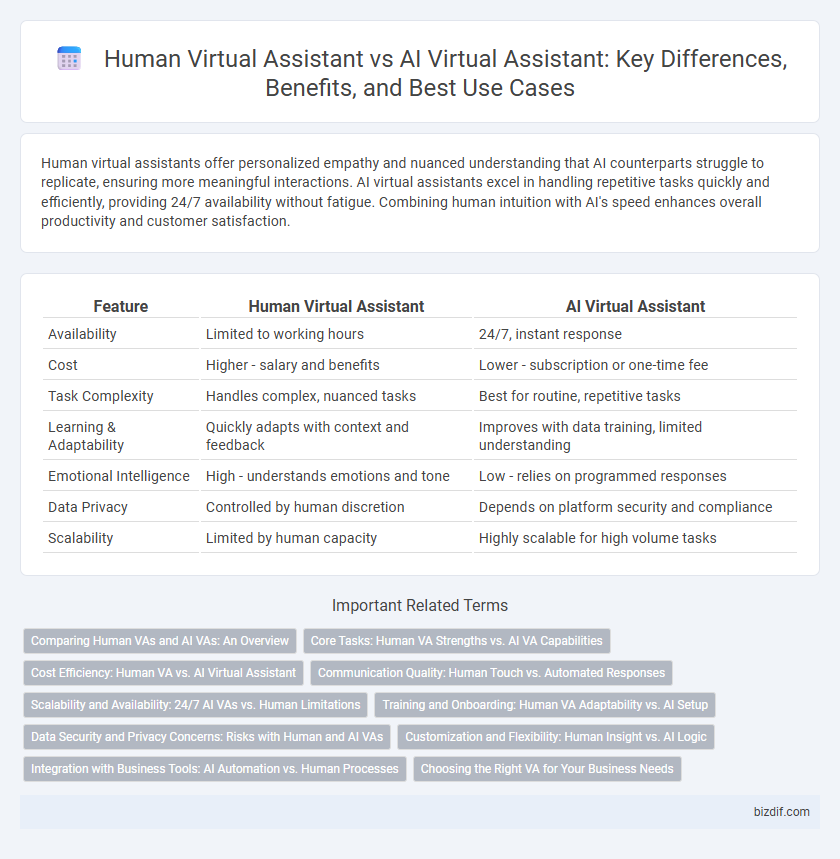Human virtual assistants offer personalized empathy and nuanced understanding that AI counterparts struggle to replicate, ensuring more meaningful interactions. AI virtual assistants excel in handling repetitive tasks quickly and efficiently, providing 24/7 availability without fatigue. Combining human intuition with AI's speed enhances overall productivity and customer satisfaction.
Table of Comparison
| Feature | Human Virtual Assistant | AI Virtual Assistant |
|---|---|---|
| Availability | Limited to working hours | 24/7, instant response |
| Cost | Higher - salary and benefits | Lower - subscription or one-time fee |
| Task Complexity | Handles complex, nuanced tasks | Best for routine, repetitive tasks |
| Learning & Adaptability | Quickly adapts with context and feedback | Improves with data training, limited understanding |
| Emotional Intelligence | High - understands emotions and tone | Low - relies on programmed responses |
| Data Privacy | Controlled by human discretion | Depends on platform security and compliance |
| Scalability | Limited by human capacity | Highly scalable for high volume tasks |
Comparing Human VAs and AI VAs: An Overview
Human virtual assistants excel at understanding complex emotions and providing personalized solutions, leveraging empathy and nuanced communication skills. AI virtual assistants offer rapid data processing, 24/7 availability, and cost-effective automation for repetitive tasks, enhancing efficiency in business operations. Combining human VAs' creativity with AI VAs' analytical prowess creates a balanced support system tailored to diverse organizational needs.
Core Tasks: Human VA Strengths vs. AI VA Capabilities
Human virtual assistants excel in complex problem-solving, empathetic communication, and managing nuanced tasks requiring emotional intelligence. AI virtual assistants perform efficiently in handling repetitive tasks, data processing, and providing instant responses through natural language processing algorithms. The synergy of human insight and AI speed creates a balanced workload, optimizing productivity and task accuracy.
Cost Efficiency: Human VA vs. AI Virtual Assistant
Human virtual assistants often incur higher costs due to salaries, benefits, and training expenses, making them less cost-efficient for repetitive or scalable tasks. AI virtual assistants, powered by machine learning algorithms, offer significant cost savings by automating routine processes and providing 24/7 availability without additional labor costs. Businesses achieve enhanced cost efficiency by integrating AI virtual assistants for standardized workflows while allocating human VAs for complex, creative tasks requiring emotional intelligence.
Communication Quality: Human Touch vs. Automated Responses
Human virtual assistants excel in communication quality by providing personalized interactions, emotional understanding, and adaptive responses that cater to the unique needs of clients. AI virtual assistants deliver fast, consistent, and scalable responses but often lack the nuanced empathy and context awareness found in human conversations. Balancing human touch with automated efficiency enhances overall service effectiveness in virtual assistance.
Scalability and Availability: 24/7 AI VAs vs. Human Limitations
AI virtual assistants provide unparalleled scalability and 24/7 availability, handling multiple tasks simultaneously without fatigue or downtime. Human virtual assistants face limitations due to work hours, fatigue, and workload capacity, which restrict their ability to operate continuously. Businesses seeking round-the-clock support and rapid task management benefit from AI VAs' constant operational capabilities.
Training and Onboarding: Human VA Adaptability vs. AI Setup
Human virtual assistants require personalized training and onboarding to understand company culture, specific workflows, and nuanced client preferences, enabling adaptability to dynamic and complex tasks. AI virtual assistants rely on initial programming and data integration, which streamlines setup but limits flexibility to adjust beyond programmed parameters without additional machine learning inputs. Investing in comprehensive human VA training enhances problem-solving skills and emotional intelligence, while AI VAs excel in rapid deployment and handling repetitive tasks with minimal onboarding time.
Data Security and Privacy Concerns: Risks with Human and AI VAs
Human virtual assistants pose risks of data breaches through inadvertent errors or malicious intent, while AI virtual assistants face vulnerabilities from hacking and data misuse due to algorithmic flaws. Data security protocols and encryption are essential for both, but human error and insider threats remain significant concerns in human VAs. AI VAs require continual updates to address privacy risks associated with large-scale data processing and potential unauthorized access.
Customization and Flexibility: Human Insight vs. AI Logic
Human virtual assistants offer unparalleled customization and flexibility by interpreting nuanced instructions and adapting to complex, evolving needs with emotional intelligence. AI virtual assistants excel in processing large datasets swiftly and delivering consistent, logic-driven responses but may struggle with tasks requiring deep contextual understanding or empathy. Combining human insight with AI logic creates a hybrid approach optimizing both personalized service and efficient automation.
Integration with Business Tools: AI Automation vs. Human Processes
AI virtual assistants seamlessly integrate with business tools like CRM systems, project management platforms, and communication apps, enabling automated data entry, scheduling, and real-time analytics. Human virtual assistants excel in contextual understanding, complex decision-making, and personalized client interactions, adapting workflows that require emotional intelligence and nuanced problem-solving. Combining AI automation with human processes creates a hybrid model that enhances efficiency while maintaining flexibility and empathy in business operations.
Choosing the Right VA for Your Business Needs
Human virtual assistants offer personalized, flexible support with emotional intelligence and complex problem-solving abilities, best suited for businesses requiring nuanced client interactions and customized task management. AI virtual assistants provide scalable, cost-effective automation for repetitive tasks, data retrieval, and 24/7 availability, ideal for businesses prioritizing efficiency and rapid response times. Assessing your business needs, budget, and the nature of tasks helps determine whether a human VA's adaptability or an AI VA's automation aligns better with your operational goals.
Human VA vs AI VA Infographic

 bizdif.com
bizdif.com